Promoting wellbeing and reflexivity at university through group counselling: an exploratory study on outcome and process
Journal title PSICOLOGIA DELLA SALUTE
Author/s Giovanna Esposito, Paola Cangiano, Angela Di Maro, Raffaella Passeggia
Publishing Year 2024 Issue 2024/1
Language Italian Pages 24 P. 90-113 File size 284 KB
DOI 10.3280/PDS2024-001005
DOI is like a bar code for intellectual property: to have more infomation
click here
Below, you can see the article first page
If you want to buy this article in PDF format, you can do it, following the instructions to buy download credits

FrancoAngeli is member of Publishers International Linking Association, Inc (PILA), a not-for-profit association which run the CrossRef service enabling links to and from online scholarly content.
In recent years, the mental health needs of university students are increasingly geared to psychological support, as evidenced by the growing demand for university counselling services. Therefore, they must be based on rigorous research. In a Clinical Health Psy-chology perspective, this study analysed, in terms of climate and impact of sessions, the process of three counselling groups conducted with students who turned to the SInAPSi center of the University of Naples Federico II, in order to explore whether a better trend of process variables is found in groups that report a better effectiveness in terms of psy-chological well-being, reflective functioning, academic engagement and academic per-formance. The results showed that the group characterized by better results, especially in relation to engagement and well-being, also presents a more harmonious process. It is therefore possible to hypothesize that, in order to promote the students’ psychological well-being, it is necessary to pay attention to both outcome and process, since they seem to be closely interconnected.
Keywords: counselling, group, psychological well-being, university students, reflective functioning, health clinical psychology
Giovanna Esposito, Paola Cangiano, Angela Di Maro, Raffaella Passeggia, Promuovere benessere e riflessività all’università attraverso il counselling di gruppo: uno studio esplorativo sull’outcome e sul processo in "PSICOLOGIA DELLA SALUTE" 1/2024, pp 90-113, DOI: 10.3280/PDS2024-001005